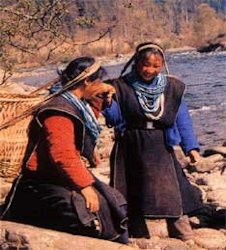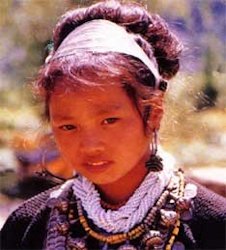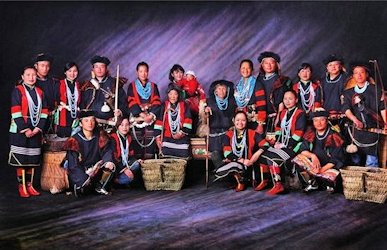|
26. Chinese Nationalities (Lhoba Minority) -- Minorities by Alphabetic Sequence |
||

|

|

|
| Lhoba Ladies | Lhoba Lady | Lhoba Lady |
|
The 2,300 people of the Lhoba ethnic minority have their homes mainly in Mainling, Medog, Lhunze and Nangxian counties in southeastern Tibet. Additionally, a small number live in Luoyu, southern Tibet. The Lhobas speak a distinctive language belonging to the Tibetan-Myanmese language family, Chinese-Tibetan language system. Few of them know the Tibetan language. Having no written script, Lhoba people used to keep records by notching wood or tying knots. People of this ethnic group were oppressed, bullied and discriminated against by the Tibetan local government, manorial lords and monasteries under feudal serfdom in Tibet. Being considered inferior and "wild," some were expelled and forced to live in forests and mountains. Largely farmers, Lhoba men and women are skilled at making bamboo objects and other crafts. They bartered such objects and animal hides, musk, bear paws, dye and captured game for farm tools, salt, wool, clothing, grain and tea from Tibetan traders. Their pilgrimages to monasteries were good opportunities for bartering. Hunting is essential to the Lhobas. Young boys start early to join adults on hunting trips. Upon reaching manhood they tracked animals in deep forests either collectively or alone. The game they caught was partly distributed among villagers, partly used for bartering and some was extorted from them by the manorial lords. Women's status in their families, as well as in society, was particularly low, and they had no inheritance rights. Lifestyle Customs, habits and dress of different clan members vary. Men in northern Luoyu wear sleeveless, button less, knee-length black jackets of sheep's wool. They wear helmet-like hats either made from bearskin or woven from bamboo stripes or rattan laced with bearskin. Barefooted, they wear bamboo earrings, necklaces and carry bows and arrows or wear swords at their side. Women have narrow-sleeved blouses and skirts of sheep's wool. They also go barefooted. Apart from their silver or brass earrings, bracelets and necklaces, the women wear a variety of waist ornaments such as shells, silver coins, iron chains and bells. Heavy ornaments are considered a symbol of wealth. |
||
| Return to Alphabetic List On to No. 27 Minority Li ⇨ | ||